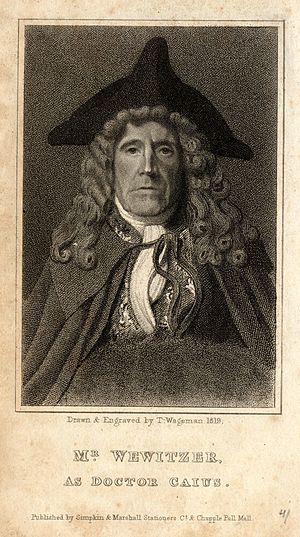Ralph Wewitzer facts for kids
Quick facts for kids
Ralph Wewitzer
|
|
|---|---|

Portrait of Ralph Wewitzer in character, as Dr. Caius in The Merry Wives of Windsor
|
|
| Born | 1748 |
| Died | 1825 |
| Occupation | actor |
Ralph Wewitzer (1748–1825) was a famous English actor. He was praised by critics for his smaller roles, but he never got the main parts in plays. He acted for 44 years and is believed to have learned over 400 different speaking roles!
Contents
Early Acting Career
Ralph Wewitzer was born on December 17, 1748, in Strand, London. His parents, Peter and Ann Wewitzer, were also involved in theatre. His father was from Switzerland or Norway. Some historians believe Ralph Wewitzer came from a Jewish family background.
Before becoming an actor, Ralph worked as a jeweler's apprentice for a while. He first appeared on stage at the Covent Garden Theatre in May 1773. His first role was Ralph in a play called The Maid in the Mill. It is said he did this show to help his sister, Sarah Wewitzer.
On November 21, 1775, he played the very first Lopez, a Spanish servant, in The Duenna by Richard Brinsley Sheridan. Ralph Wewitzer stayed at Covent Garden for 14 years. During this time, he played many different characters. Some of his roles included Filch in The Beggar's Opera, Jerry Sneak in The Mayor of Garratt, and Dr. Caius in The Merry Wives of Windsor. He often played servants or similar characters in comedies.
New Theatres and Challenges
On July 8, 1780, Ralph Wewitzer performed at the Haymarket Theatre. He appeared there for many summers. In 1785, another actor named John Palmer built the Royalty Theatre. When Palmer faced problems, he asked Wewitzer to manage the theatre in 1789. Ralph left Covent Garden to try and make the Royalty Theatre a popular place. However, this project did not go well and caused him some trouble.
In August 1790, Wewitzer returned to the Haymarket Theatre. By September 1791, he was working with the Drury Lane company at the King's Theatre in Haymarket. At Drury Lane, he played Gripe in The Cheats of Scapin and Moses in Sheridan's The School for Scandal.
Later Years and Retirement
After the Drury Lane Theatre had a fire in 1809, Ralph Wewitzer moved with the acting company to the Lyceum Theatre. He continued to perform there. On October 10, 1812, when Drury Lane Theatre reopened, he was one of the gravediggers in Hamlet. Soon after this, his name stopped appearing on theatre programs.
Ralph Wewitzer helped arrange the marriage of actress Harriot Mellon to a wealthy banker named Thomas Coutts in 1815. Harriot Mellon later became very rich after Coutts passed away. Wewitzer was a friend and advisor to Harriot.
In his final years, Ralph Wewitzer received a small payment from the Covent Garden theatre fund. He passed away on January 1, 1825.
Acting Style
Ralph Wewitzer became well-known for playing funny characters, especially foreigners. At that time, actors often created the accents and mannerisms for these roles themselves. Comedic Jewish characters were becoming popular in plays during the late 1700s.
Wewitzer was one of several actors known for playing Jewish characters with a specific accent. However, some critics, like John Williams, said that while Wewitzer was excellent in his roles, his acting range might have been limited. Williams wrote that Wewitzer's Jewish characters seemed like they were "born in Duke's Place," which was a place in London with a famous synagogue.
Written Works
Besides acting, Ralph Wewitzer also wrote some works:
- The Gnome: A pantomime (a type of play with music and no talking) for the Haymarket Theatre in 1788.
- The Magic Cavern: A pantomime for the Covent Garden Theatre, performed in 1784 and published in 1785.
- School for Wits: A collection of jokes and funny stories, published in 1815.
- Theatrical Pocket-book, or brief Dramatic Chronology: A book about theatre history from 1814.
- A brief Dramatic Chronology of Actors, &c.: Another theatre history book from 1817.
Family Life
Ralph Wewitzer was married twice. His first marriage was in Liverpool in 1776 to Mary Daniels, and they had one daughter. He married his second wife, Miss Brangin, in 1787.
 | Frances Mary Albrier |
 | Whitney Young |
 | Muhammad Ali |

